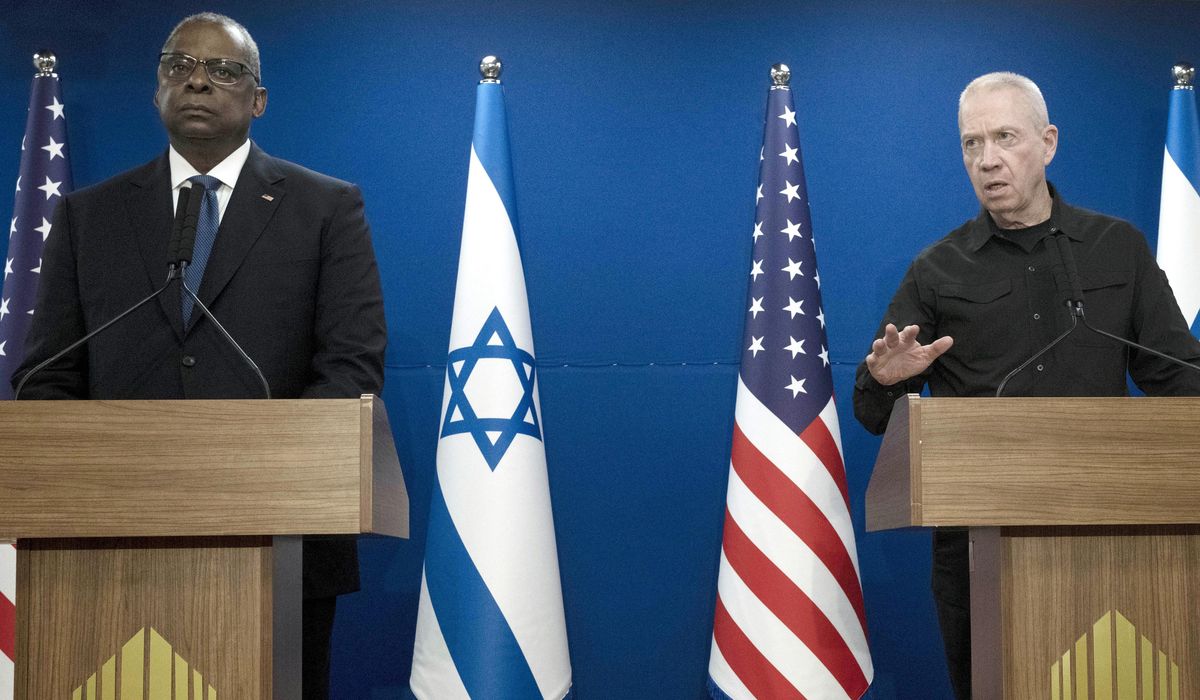


Defense Secretary Lloyd Austin on Tuesday warned his Israeli counterpart that any heavy incursion to take out Hamas’ remaining battalions inside Rafah should be delayed until the safety of about 1.5 million Palestinian civilians there can be secured.
Mr. Austin told Israeli Defense Minister Yoav Gallant that the U.S. supports Israel’s right to defend itself against Hamas, which launched an Oct. 7 rampage that killed more than 1,200 people and resulted in more than 200 others taken hostage. However, he said the safety and protection of civilians in Rafah should be its priority.
“A military operation should not proceed without a credible and implementable plan that ensures safety and humanitarian support for civilians,” a senior Defense Department official later told reporters at the Pentagon. “The military aspect of the operation should not proceed until the humanitarian aspects have been fulsomely addressed.”
The two men met shortly before the news broke that Israeli commanders had confirmed for the first time that Marwan Issa, considered the deputy head of Hamas’s military operations inside Gaza, had been killed in a bombing attack earlier this month. U.S. officials had said more than a week ago they believed Issa, deputy commander to Gaza Hamas military commander Yahya Sinwar, had died in an Israeli strike.
Decapitating the Hamas leadership inside Gaza, along with the freeing of the estimated 100 hostages still held by the military group, has been a prime objective of the Israeli retaliatory offensive. Rear Adm. Daniel Hagari said Tuesday that Israeli intelligence had confirmed the Hamas leader was killed when fighter jets struck an underground compound in central Gaza between March 9 and 10.
Hamas official Izzat al-Risheq said the Israeli announcement was intended to distract from the military’s failure to achieve its war goals in Gaza, the Associated Press reported. In a statement released online, the Hamas official said Israel‘s narrative about the killing was false.
The Pentagon official said the U.S. wants to help Israel find an alternative to a full-scale and possibly premature military operation that could put civilians in danger. Rafah is a major population hub on the border with Egypt and the site of a primary humanitarian corridor into the Gaza Strip. About two-thirds of the Palestinian enclave’s remaining population is sheltering there.
“There have been far too many civilian casualties in Gaza and Rafah,” the senior Defense Department official said. Mr. Austin “expressed our goal to help Israel find an alternative.”
The Israel Defense Forces could focus on precision targeting to eliminate Hamas leaders rather than mount a full-scale invasion of Rafah. They could also increase security along the southern border to ensure it won’t be a smuggling route for weapons and terrorists, the Defense official said.
Left unclear is whether Israel will heed the suggestions from the Pentagon. Mr. Gallant gave no sign they would agree to any halt to the military campaign against Hamas. Ahead of a meeting with White House National Security Adviser Jake Sullivan, he said Israel has “no moral right to stop the war while there are still hostages in Gaza.”
Relations between the Biden administration and Israeli Prime Minister Benjamin Netanyahu have become tense, especially after the U.S. this week failed to veto a cease-fire resolution in the U.N. Security Council that made no mention of the hostages. Mr. Netanyahu angrily recalled a second delegation dispatched to Washington to protest the move, even while Mr. Gallant‘s meetings proceeded.
“Israel will pursue and achieve its just war objectives: Destroying Hamas’ military and governmental capacities, the release of all the hostages, and ensuring Gaza will not pose a threat to the people of Israel in the future,” Mr. Netanyahu said Tuesday in a statement.
While President Biden has pressed for a short-term cease-fire to protect civilians and allow new international aid into Gaza, Mr. Netanyahu on Tuesday called Hamas’s cease-fire conditions — including a full withdrawal of Israeli forces from Gaza — “delusional.”
While there may be no love lost between the conservative Israeli prime minister and the liberal American president, the senior Defense official on Tuesday said Mr. Austin and Mr. Gallant have a close working relationship.
“They know each other well. They trust each other. They are friends,” he said. “The sharing of the secretary’s ideas, I would say, was met by very receptive ears.”
— This article was based in part on wire service reports.
• Mike Glenn can be reached at mglenn@washingtontimes.com.
